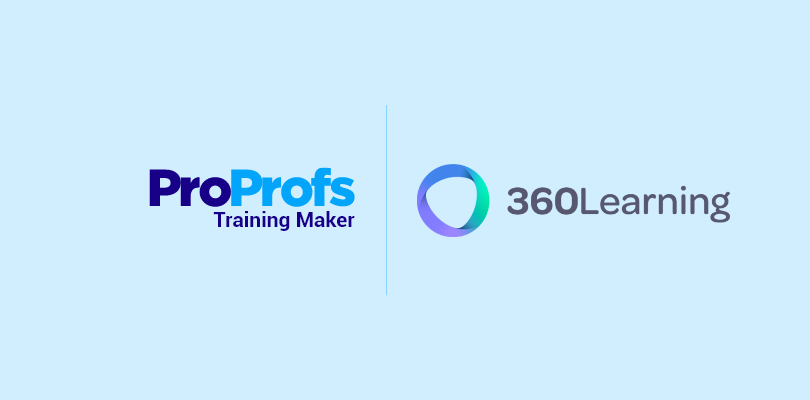In the age of remote work and online learning, traditional training methods are about as effective as a dial-up modem in a 5G world. Businesses and educational institutions are pressured to create and deliver engaging content, and things can get a little chaotic.
But fear not! There’s a solution that can transform your learning strategy from frantic to fantastic: a learning content management system (LCMS).
Now, you might be thinking, “Oh great, another acronym.” But trust me, an LCMS is more than just a buzzword. It can help you create, manage, and deliver digital content easily and efficiently. And with the global LCMS market projected to reach $25.7 billion by 2025, it’s clear that this technology is here to stay. In this post, I will share with you the best systems and discuss the benefits, features, and use cases of these tools.
| Top LCMS Tools | Best For | Pricing |
|---|---|---|
| ProProfs Training Maker | Online Training & LMS | Forever free for small teams. Paid plan starts at$1.99/learner/month. |
| Absorb LMS | Complex Training Needs | Custom pricing |
| Docebo | Complex Enterprise Training | Custom pricing |
| 360Learning | Collaborative Learning | Starts at $8/registered user/month |
| LearnUpon | Delivering Impactful Training | Custom pricing |
| Litmos | Off-the-Shelf Training | Custom pricing |
| SkyPrep | Online Training & Employee Development | Custom pricing |
| Tovuti | Corporate Learning & Development | Custom pricing |
| Forma LMS | Hybrid Learning | Open source platform. Custom pricing for paid plans |
| SC Training | Mobile Learning | Free plan available (Lacks advanced analytics). Paid plan starts at $5 per learner/month |
What Is a Learning Content Management System (LCMS)?
A learning content management system or LCMS is a software application that combines the functions of a learning management system (LMS) and a content management system (CMS). Want to know the difference between an LMS and a CMS? Read this guide.
LCMS enables the creation, management, and delivery of e-learning content. With it, you can develop multimedia-rich and interactive online courses, streamline content distribution, and track learner progress and engagement. This makes it an essential tool for effective end-to-end e-learning solutions.
LCMS vs LMS: What’s the Difference?
Before diving into other aspects like features, benefits, and tools, I’d like to address a common question: LCMS vs LMS. Many people tend to mix them up, so clarifying the distinction is important. Here’s a quick comparison:
| Criteria | LCMS | LMS |
|---|---|---|
| Purpose | Primarily focuses on creating, managing, and delivering content. | Manages the delivery and tracking of training programs and courses. |
| Content | Offers tools for content creation and customization. | Primarily used for distributing pre-created content. |
| Audience | Tailored for content developers and instructional designers. | Aimed at administrators, learners, and trainers. |
| Functionality | Focuses on content development and organization. | Focuses on learner management, assessment, and reporting. |
So, LCMS is content creation-focused, while LMS handles learner management and course delivery. Now that we’ve cleared this up, let’s move forward!
What Are the Benefits of Using an LCMS?
I have been using LCMS for a number of years, and I’ve discovered several key benefits that truly enhance the learning experience. Here are some advantages that I’ve personally found:
- Interactive and Multimedia-Rich Content: Develop engaging online courses with various media formats like videos, quizzes, and simulations.
- Centralized Content Management: Easily store and manage all learning materials in one place to ensure ease of accessibility and updates.
- Enhanced Collaboration: Enables multiple authors to work together on content development.
- Personalized Learning Paths: Tailor learning experiences to meet each learner’s needs and preferences. Read this guide on Learning Paths 101: Definition, Benefits, and Steps to Create One.
- Scalability: Easily handle increasing numbers of users and larger volumes of content without sacrificing performance or functionality.
These benefits make LCMS an indispensable tool for engaging and effective online learning or training.
Here’s a quick case study:
American Integrity Courses (AIC) benefited from using ProProfs’ Learning Content Management System (LCMS) by simplifying their course creation process. Before using the platform, AIC faced challenges with designing and delivering educational content at scale. ProProfs provided ready-to-use, professionally designed templates that made creating various courses, from anger management to DUI classes, much easier. The system’s flexibility allowed AIC to customize content to suit their needs while enabling them to sell courses online. With this efficient solution, AIC saved time, expanded their course offerings, and delivered educational material quickly and professionally.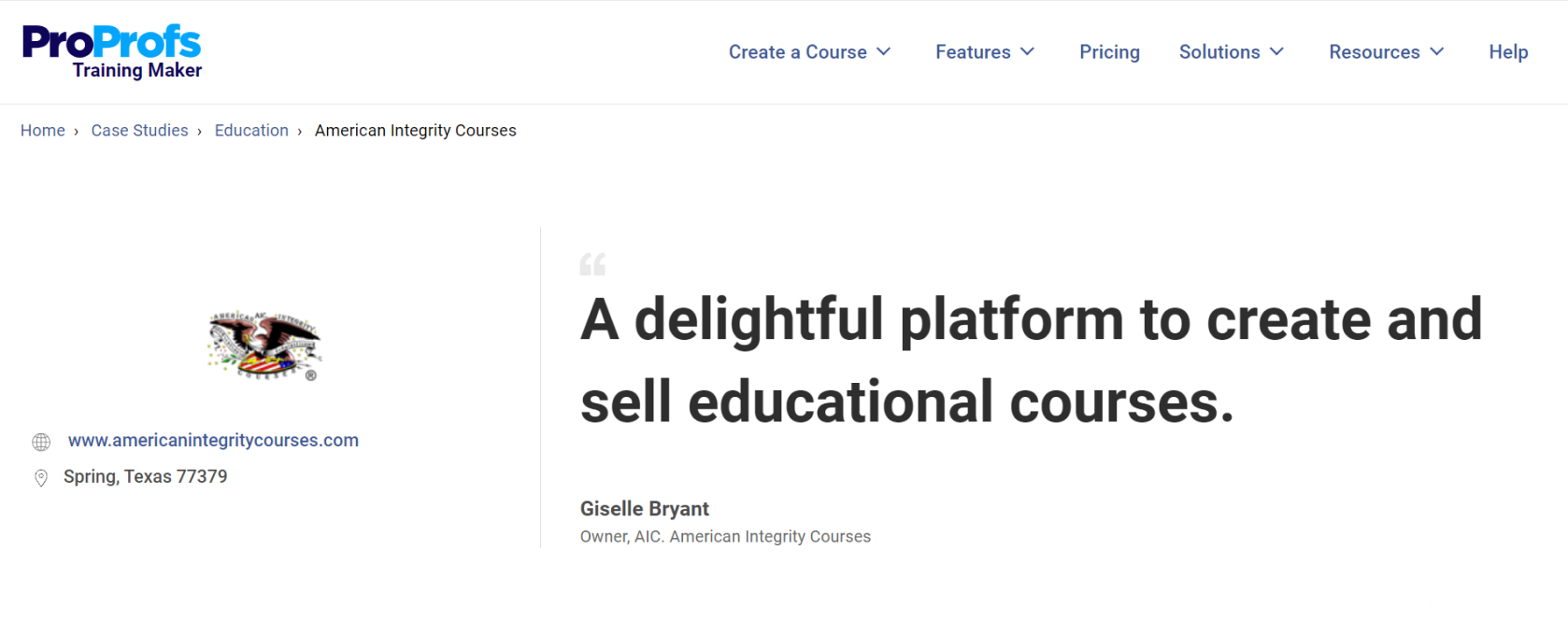
What Are the Essential Features of an LCMS?
Here are some core features of an LCMS that can transform your online training programs:
- AI Content Creation: Most LCMS tools have a built-in AI course creator for developing custom courses, lessons, quizzes, and surveys in minutes.
- Central Repository: LCMS tools offer a single, accessible place for all learning materials that ensures easy retrieval, sharing, and updates.
- Version Control: Keep track of changes and updates and manage different content versions effortlessly.
- Collaboration: Enhance teamwork among content creators and stakeholders, thus improving efficiency and creativity.
- Personalization: Customize learning experiences with need-based learning paths to meet individual needs and preferences.
- Assessment Tools: Enable tests, assessments, and quizzes to evaluate learners’ understanding and retention.
- Analytics: Generate detailed reports on learner progress and engagement. This will help you make data-based decisions.
- Integration: Seamlessly integrate with other systems, such as LMS and HRMS like BambooHR. Ensure interoperability to allow smooth data exchange and cohesive workflow across platforms.
Let’s now move on to the heart of the discussion: which are the top LCMS platforms to choose from? I understand it takes a lot of research to select a solution that aligns with your business needs. That’s why I have done the groundwork for you and have shortlisted the top 10 systems.
Get Free LMS Software — All Features, Forever.
We've helped 567 companies train 200,000+ employees. Create courses in under a minute with our AI LMS or use 200+ ready-made courses on compliance, harassment, DEI, onboarding, and more!
List of the Best Learning Content Management Systems
In coming up with this list of tools, I considered factors like ease of use, scalability, integration capabilities, and overall user satisfaction.
1. ProProfs Training Maker – Best for Easy Online Employee Training & LMS
As a cloud-based learning content management system, ProProfs Training Maker helps create and deliver training materials with ease. Its intuitive interface is a dream to work with. Even if you are not tech-savvy or have coding skills, you can quickly develop interactive courses, quizzes, and assessments for employee training.
The platform has a built-in AI course authoring tool that saves you time on manual work. It also supports various content formats, such as videos, presentations, and documents, to create a rich, diverse learning experience for your audience. Learners can take these courses on any device, anytime, anywhere.
One of my favorite features of this LMS is how it handles content management. With version control and content reuse, you can efficiently keep everything up-to-date and consistent without hassle. Plus, the detailed analytics are a lifesaver. You get insights into learner progress and can pinpoint areas that need improvement, which makes your training programs more effective.
What you will like:
- Multiple Admins: Empower your team by assigning multiple administrators to manage and oversee your training programs.
- Training Calendar: Keep your training schedule organized and accessible with a built-in calendar that tracks all your important dates and deadlines.
- Gamification: Boost learner engagement and motivation by incorporating game-like elements such as badges, points, and leaderboards.
- XAPI/SCORM Compliance: Ensure seamless integration and compatibility with other eLearning systems and platforms through XAPI and SCORM compliance.
- Learning Record Store (LRS): Gain valuable insights into learner progress and performance with a comprehensive Learning Record Store that tracks all learning activities.
- Multiple Languages: Reach a global audience and cater to diverse learners by creating and delivering training content in various languages.
What you may not like:
- No downloadable or on-premise version
- Dark user interface option is not yet available
- No dedicated account manager for the free plan, unlike the paid version
Pricing:
Forever FREE plan for small teams. Paid plan starts at $1.99/learner/month with a 15-day money-back guarantee. There are no hidden charges.
2. Absorb LMS – Best for Complex Training Needs
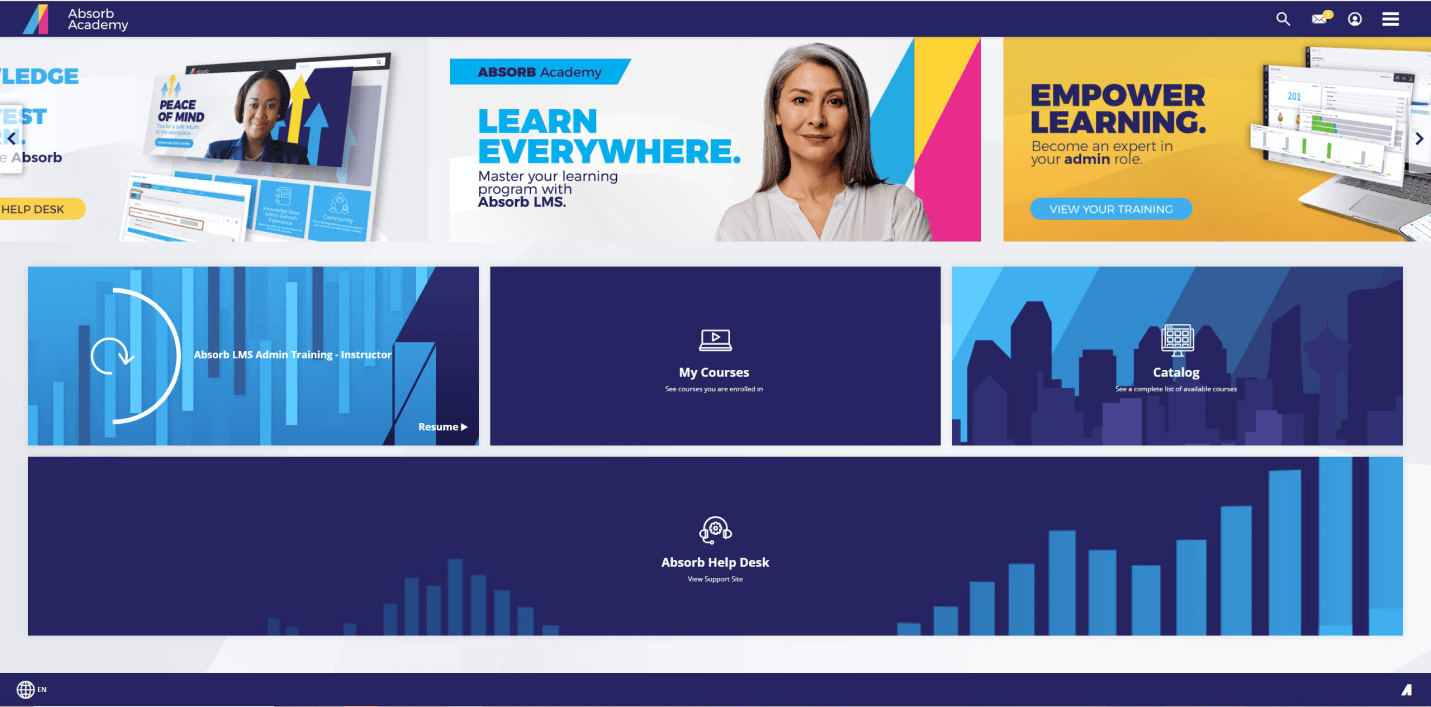
Absorb LMS is a versatile powerhouse that easily tackles complex learning needs. Think personalized learning paths that adapt to each individual, gamified elements that make training fun (yes, fun!), and a sleek mobile app that lets learners access content on the go.
But don’t let the playful interface fool you, as Absorb LMS is packed with serious features like robust reporting, seamless integrations, and a content library. Whether you’re upskilling your workforce, onboarding new hires, or simply ensuring compliance, Absorb LMS is your trusted partner in creating a learning culture that thrives.
It’s like having a dedicated learning coach for your entire organization, but without the whistle and the intense pep talks (unless that’s your thing, then we can definitely work with that).
What you will like:
- Whether you’re a small startup or a multinational corporation, Absorb LMS grows with you
- Absorb uses the magic of AI to personalize the learning experience with tailored recommendations, adaptive learning paths, etc.
- Saves time on course creation with the extensive library of ready-to-go courses
- Foster collaboration and knowledge sharing with built-in social learning tools like forums, discussion boards, and peer-to-peer learning
What you may not like:
- Features on the “Ideas Page” can take a long time to be implemented
- Limited offline content availability, even with the mobile app
- Purchasing content libraries can be expensive, making it inaccessible for some organizations
Pricing:
Custom pricing
3. Docebo – Best for Complex Enterprise Training
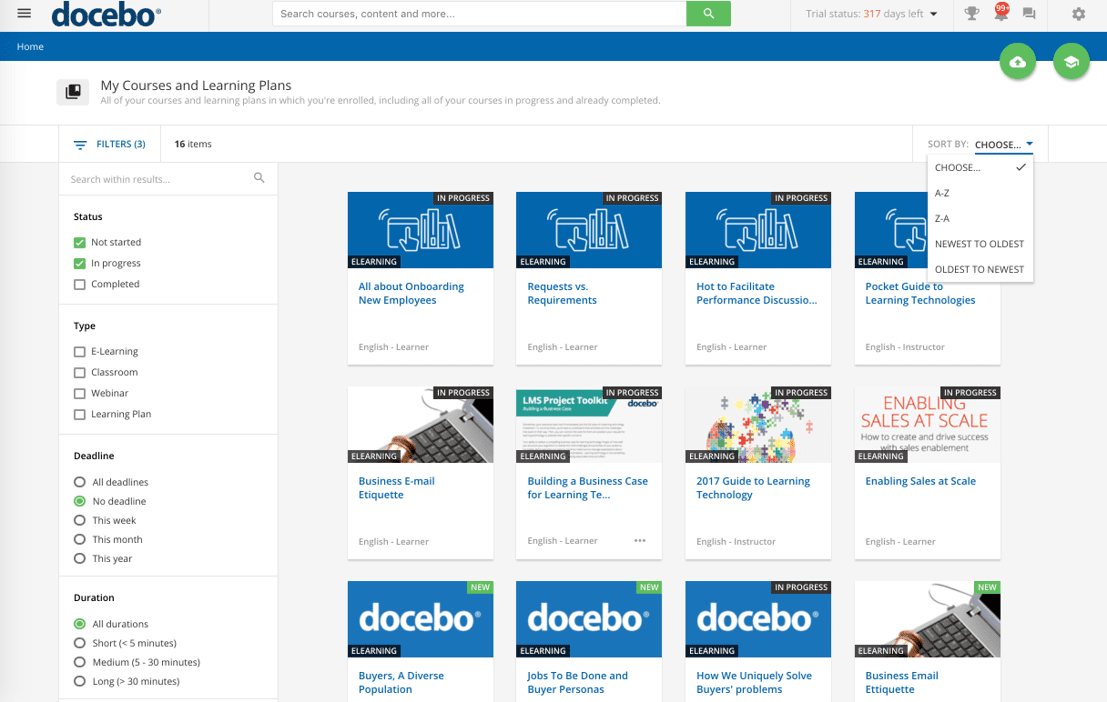
Are you tired of juggling several different systems to manage your enterprise training? Docebo is an all-in-one learning suite and the best learning content management system streamlining everything. It’s not just an LMS but a powerful CMS that lets you create and deliver engaging content, track learner progress, and measure the impact of your programs. But here’s the kicker: Docebo excels at handling the complex needs of enterprise training.
Manage thousands of users, create structured learning paths for different roles and departments, and generate custom reports to gain deep insights into learning performance.
Plus, Docebo makes compliance a breeze with automated certificate management and seamless integrations with your existing HR systems. Ready to ditch the complexity and embrace a learning solution that truly scales? Discover the power of Docebo today!
What you will like:
- Gain valuable insights into learning progress and performance with advanced analytics, reporting, and dashboards
- Leverage innovative AI tools to create engaging and effective learning content quickly and easily
- Provide learners with access to training materials anytime, anywhere with Docebo’s mobile app
- Ensure compliance with full certification and compliance tracking features
What you may not like:
- The platform can experience occasional performance issues and slowdowns
- Administrative options for staff members are somewhat limited
- Docebo could improve by better integrating formal and informal learning content into a single, unified library for easier management
Pricing:
Custom pricing
4. 360Learning – Best for Collaborative Learning
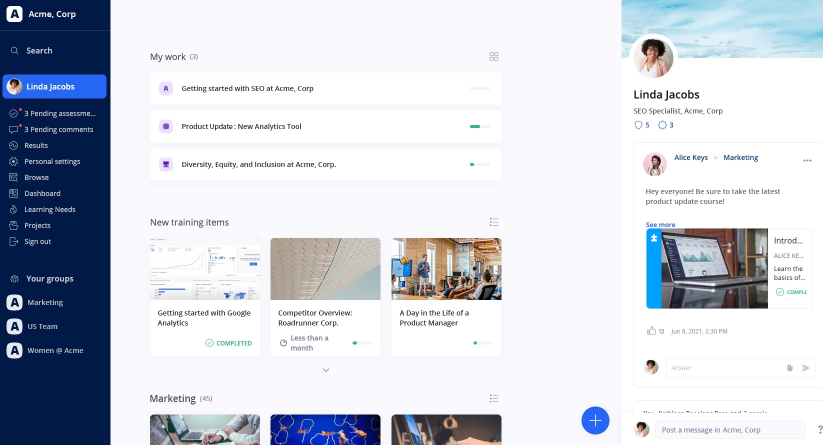
As an L&D professional, I’m always looking for learning content management systems that make my life easier, and 360Learning has been great. It’s not just an LMS but a full-fledged LCMS that gives me complete control over my learning content. With intuitive authoring tools and AI-powered assistance, I can create engaging courses in minutes.
You can generate quizzes with a click and even get suggestions for course content! But here’s where it gets really cool: 360Learning has robust content management features that let me organize all my learning materials in one central library. I can easily update and version control my content, ensuring everyone can access the latest and greatest.
Plus, with built-in collaboration tools, I can seamlessly involve subject matter experts and foster a culture of knowledge sharing. If you’re looking for a genuinely engaging, intuitive, and built LCMS for the modern workplace, look no further than 360Learning.
What you will like:
- Empower subject matter experts to contribute to collaborative course creation
- Integrate content from various platforms like Genially, Loom, and Prezi
- Simplify global training delivery with comprehensive multilingual support
- Track learner progress and demonstrate training impact with robust analytics
What you may not like:
- Setting up and managing the platform in multiple languages can be time-consuming
- Content library management and search functionality needs improvement
- Occasional glitches or bugs can disrupt the user experience
Pricing:
Starts at $8/registered user/month
5. LearnUpon – Best for Delivering Impactful Training
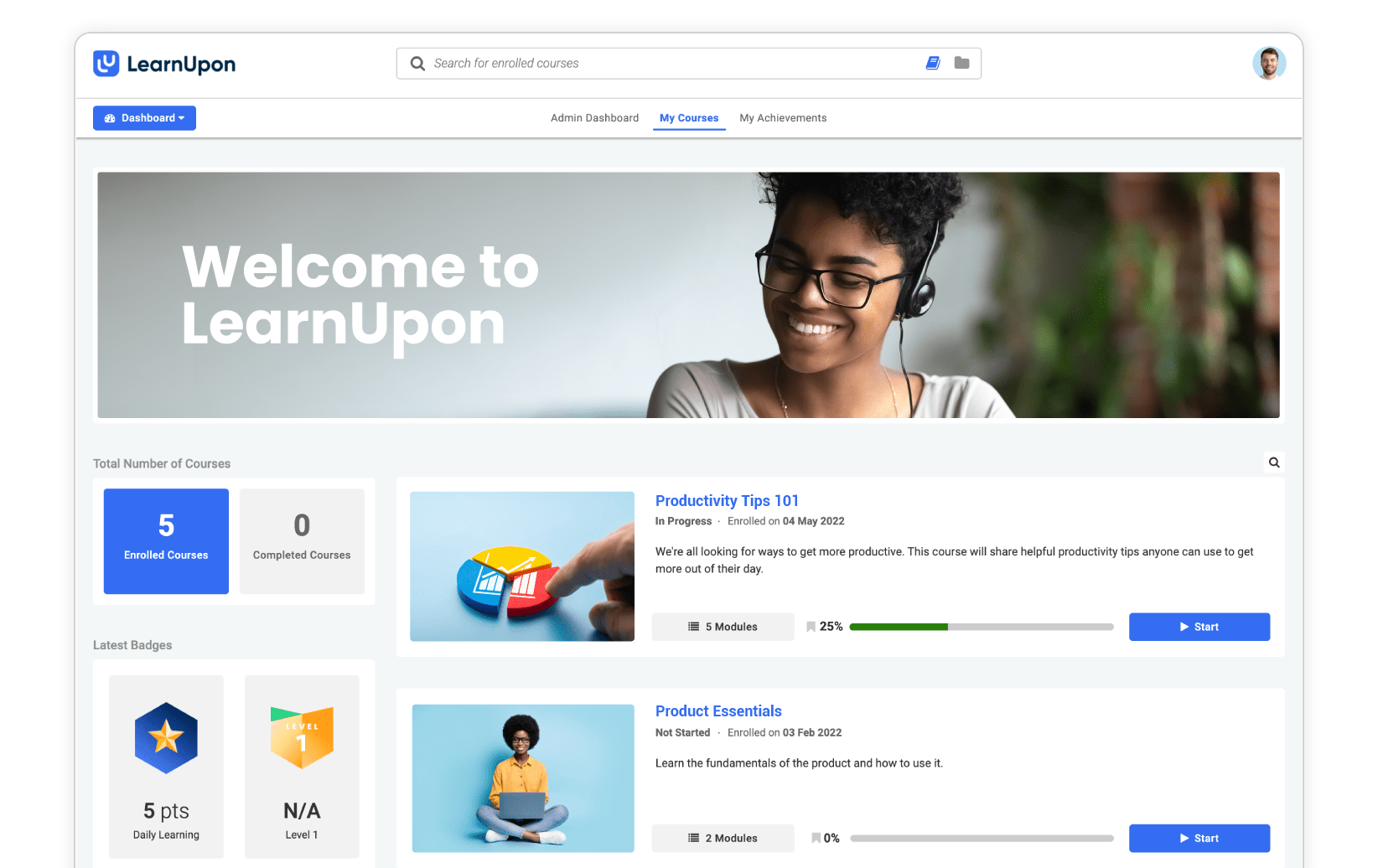
The next LCMS tool I’d recommend is LearnUpon, and here’s why it stands out: LearnUpon excels at providing impactful and tailored learning experiences. It goes beyond basic user management with its flexible group features, allowing you to segment learners and deliver targeted content based on their roles, departments, or specific products. This level of personalization ensures that training is relevant and engaging for every learner.
Plus, this learning content management system makes it easy to delegate administrative tasks with its unique user types and permissions. You can empower instructors and managers with specific controls, streamlining your workflow and ensuring everyone has access.
Plus, LearnUpon makes it easy to create interactive courses, deliver training through various formats like videos and quizzes, and even build personalized learning paths. If case you are focusing on personalized learning and efficient administration, LearnUpon is a top contender.
What you will like:
- Administrators find it simple to set up and manage courses within the platform
- Updating SCORM content is straightforward and doesn’t disrupt learner progress
- LearnUpon offers built-in features for optimizing the public-facing storefront for search engines and easy content addition
- Customizing the storefront is easy, with multiple layout options available
What you may not like:
- Searching for specific courses, especially with multiple versions, can be challenging for administrators due to limited filtering options
- Standard reports cannot generate data for course bundles
- Creating and managing certificates is cumbersome, with slow loading times and issues with portrait orientation printing
Pricing:
Custom pricing
6. Litmos – Best for Off-the-Shelf Training
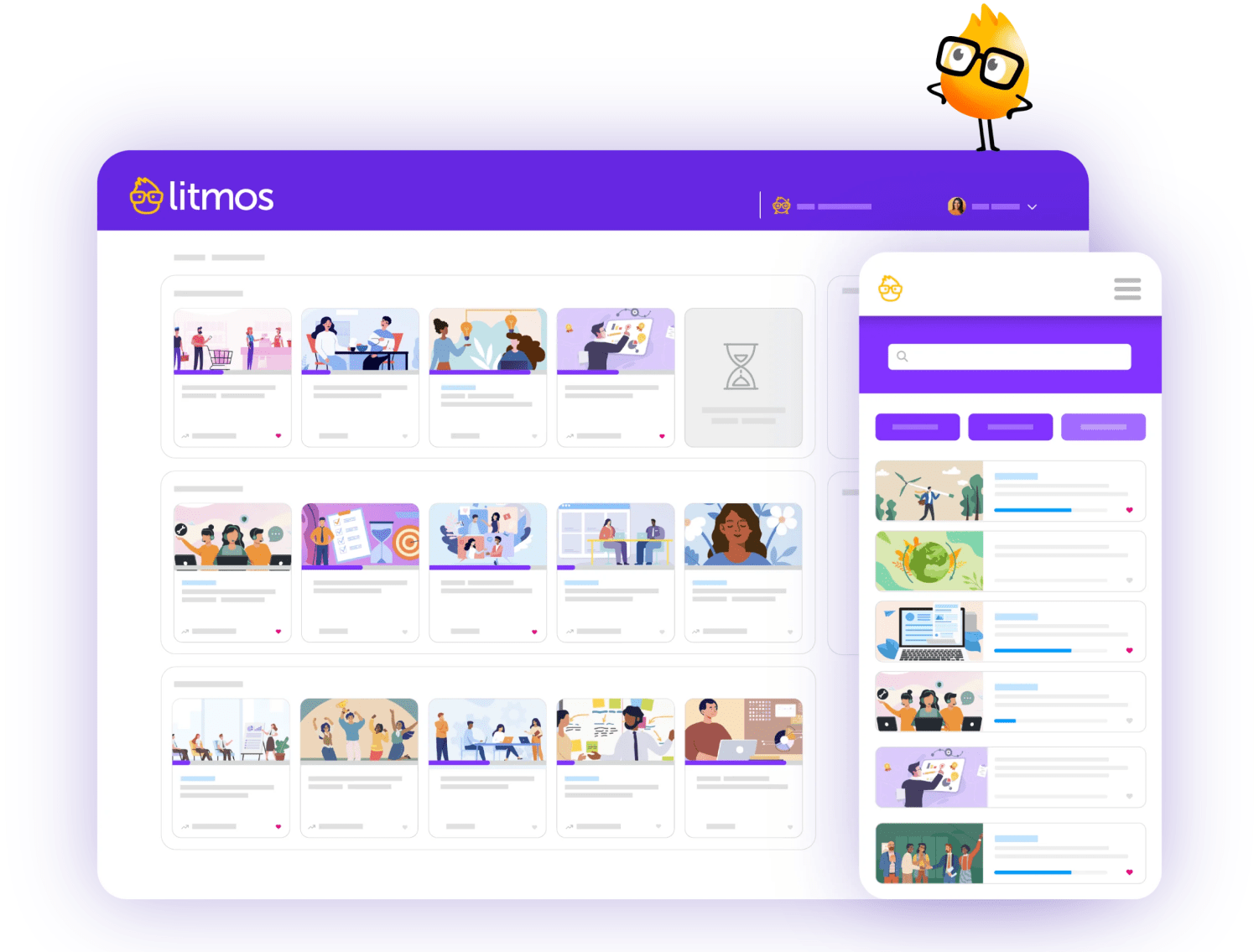
Litmos is an all-in-one learning content management system software designed to make training easier, quicker, and more impactful. It combines innovative technology with quality content to deliver an exceptional learning experience. Access a vast library of over 80,000 off-the-shelf courses covering a wide range of topics and readily available for use in your LMS.
Litmos supports various training delivery methods, including instructor-led training (ILT/vILT) and external training options. The platform is packed with features to enhance learner engagement, provide manager insights, and enable mobile learning. Robust reporting and analytics help you track progress and measure the effectiveness of your training programs.
Plus, Litmos integrates with other business systems to streamline workflows. Whether you’re training employees, customers, or partners, Litmos provides the tools and resources to achieve your learning goals.
What you will like:
- With Litmos, you can create engaging courses using the built-in authoring tool, leverage AI-powered features like the AI Assistant and AI Playlists
- Litmos boasts an intuitive and easy-to-use interface that is appreciated by administrators, managers, and learners
- Easily connect Litmos with your existing HRIS, CRM, and other business systems using 100+ out-of-the-box connectors or open APIs
- Leverage AI for tasks like scoring video assessments, creating personalized learning paths, and automating administrative tasks
What you may not like:
- Custom reports cannot be easily shared. Users have to export and then share reports
- The course creation process could be more efficient. While functional, the process for building courses within Litmos could be streamlined for improved productivity
- Lack of a built-in spell checker. The absence of this basic feature can hinder content quality
Pricing:
Custom pricing
7. SkyPrep – Best for Online Training & Employee Development
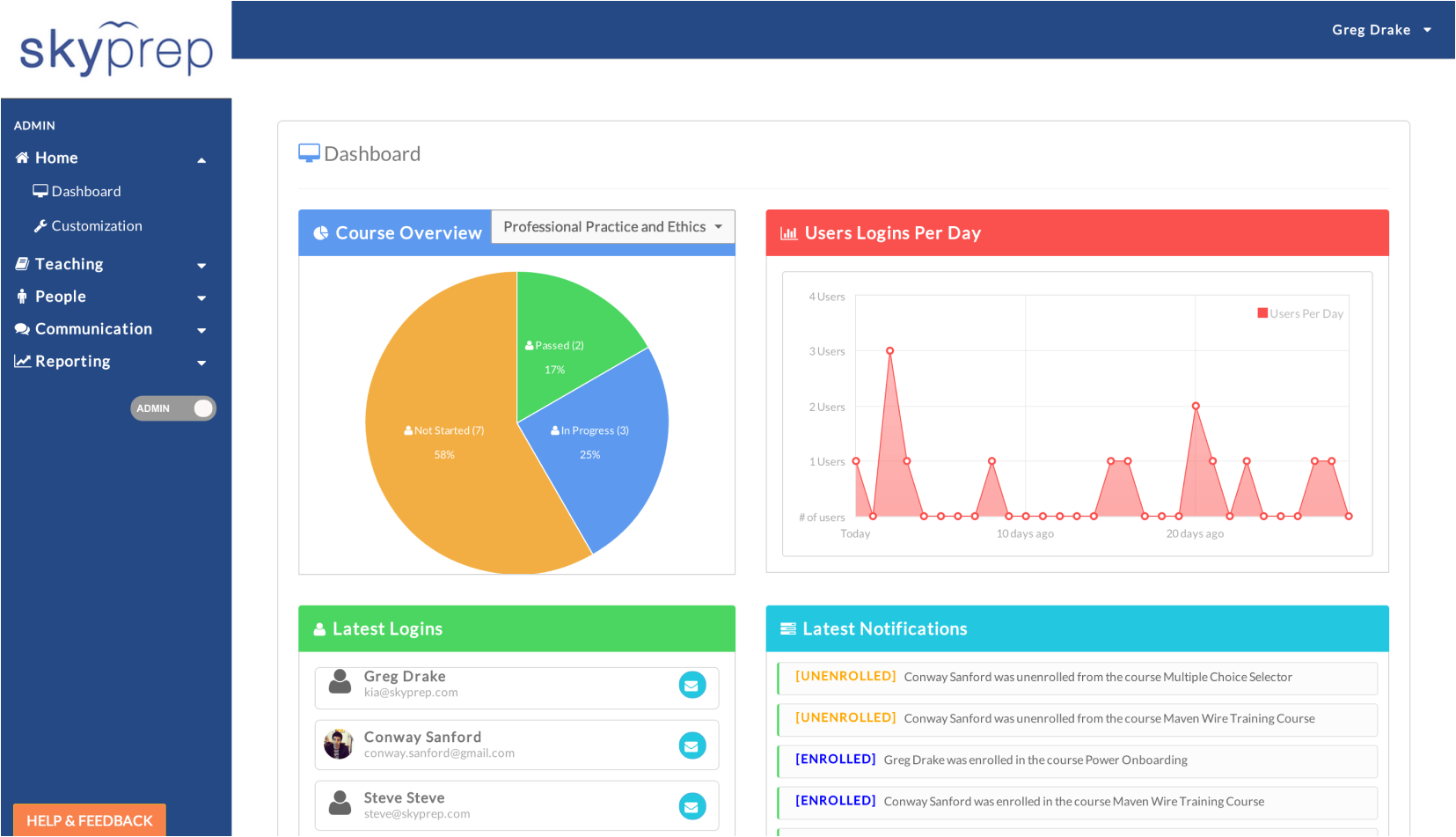
Ready to ditch the training headaches and create learning experiences that actually get results? SkyPrep is an award-winning platform that goes beyond your typical learning management system. It’s a comprehensive LCMS, designed to make your training truly shine.
You can effortlessly create engaging courses complete with assessments and knowledge checks while keeping your learners motivated with gamification. You could also automate user management and reduce errors. You can gain deep insights into your training programs with comprehensive reporting and analytics.
This powerful platform helps you streamline workflows, customize the learning environment to match your branding, and ensure the security of your data with enterprise-grade security.
What you will like:
- A centralized platform for organizing all training materials in one location
- User-friendly interface makes it easy for both administrators and learners to navigate
- Fast deployment allows for quick implementation of training programs
- Versatile platform suitable for various training needs, from employee onboarding to customer education
What you may not like:
- The notification features need improvement, such as notifying learners of their scores after manual grading
- The inability to track who views resources within the platform hinders content engagement analysis
- SkyPrep users need to rely on third-party integrations for virtual classroom sessions or live training events
Pricing:
Custom pricing
8. Tovuti – Best for Corporate Learning & Development
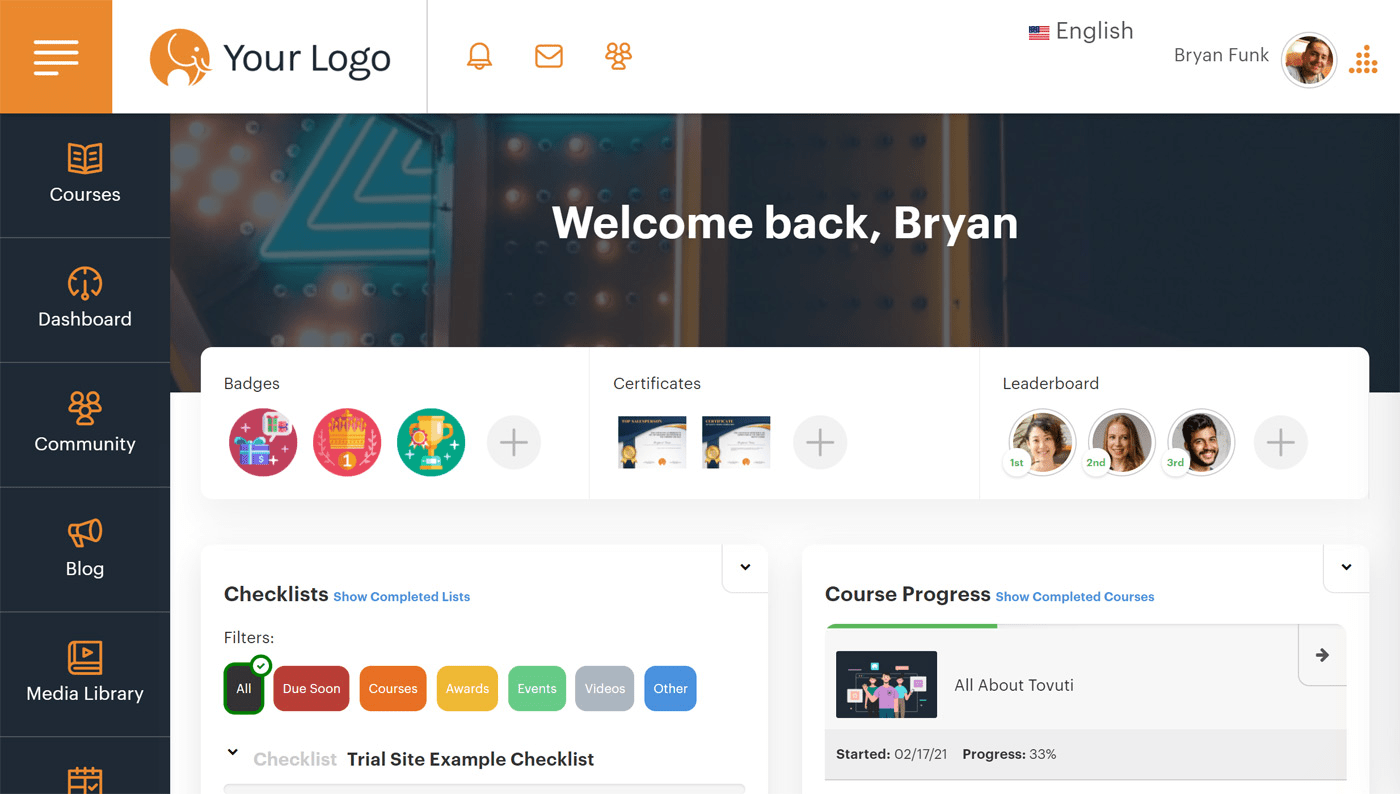
Tovuti is a vibrant and engaging learning hub designed to boost employee knowledge and your business ROI. With its interactive content, gamified learning paths, and a mobile-first approach, training becomes fun and accessible for everyone, no matter where they are.
Tovuti empowers you to create a dynamic learning environment. Build courses from scratch, import existing content, or tap into a library of over 30,000 pre-built courses to get your training programs up and running quickly. With Tovuti’s intuitive administration tools, you can automate programs, tailor learning paths, and make data-driven decisions to optimize your training strategy.
Apart from content management, it fosters a learning and development culture. It makes it easy to onboard new hires and offers leadership development programs to fuel career growth. With Tovuti’s interactive features, like memory games, 360-degree images, and leaderboards, you can keep employees engaged and motivated to learn.
What you will like:
- Get your training program up and running quickly with Tovuti’s turnkey platform, which can be ready to use in just a few hours
- Connect Tovuti with popular platforms like Salesforce, BambooHR, and Workday to streamline workflows
- Break down training content into bite-sized, easily digestible microlearning modules to improve knowledge retention
- It also complies with SCORM standards for easy content import and compatibility
What you may not like:
- In columns mode, it’s not possible to choose a font style when inputting text
- Users cannot download files uploaded on Tovuti, which can be inconvenient for those needing offline access to learning materials
- There’s a steep learning curve due to the customizable nature of the platform
Pricing:
Custom pricing
9. Forma LMS – Best for Hybrid Learning
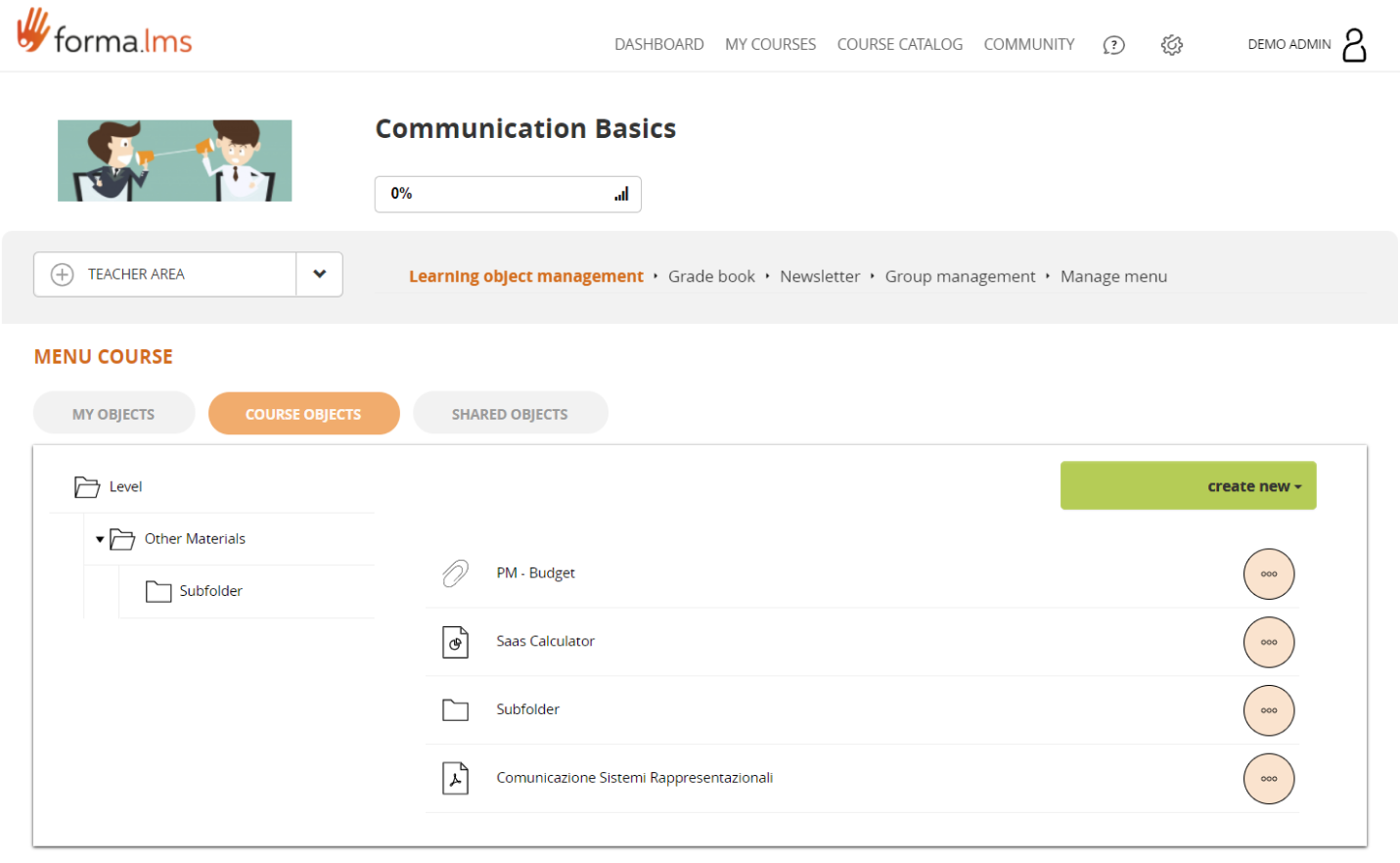
Tired of rigid LMS platforms that just don’t quite fit your company’s needs? Say hello to Forma LMS, the award-winning, open-source solution that puts the power of flexibility in your hands.
It’s a great learning management content system that adapts to your processes, integrates with your intranet software, and offers a modern, responsive layout that delights learners and instructors. With Forma LMS, you can deliver diverse training materials, from interactive SCORM modules to engaging videos to support hybrid learning. You can even easily create robust assessments and quizzes to measure knowledge.
Forma LMS empowers you to customize and extend the platform with various plugins. Plus, with an active community and dedicated support, you’re never alone on your learning journey.
What you will like:
- Offers a user-friendly interface that’s easy to navigate, even for those who aren’t tech-savvy
- The platform is highly adaptable, with various plugins and customization options
- Provides a wide range of features for managing all aspects of your training program
- Benefit from an active community of users and developers who contribute to the platform’s growth and offer support
What you may not like:
- The mobile experience is less intuitive or feature-rich than the desktop version
- Being an open-source platform, you might encounter occasional bugs or technical issues that may require community support or custom development to resolve
- Forma LMS lacks more advanced gamification features than other LMS platforms offer
Pricing:
Open source platform. Custom pricing for paid plans
10. SC Training (Formerly EdApp) – Best for Mobile Learning
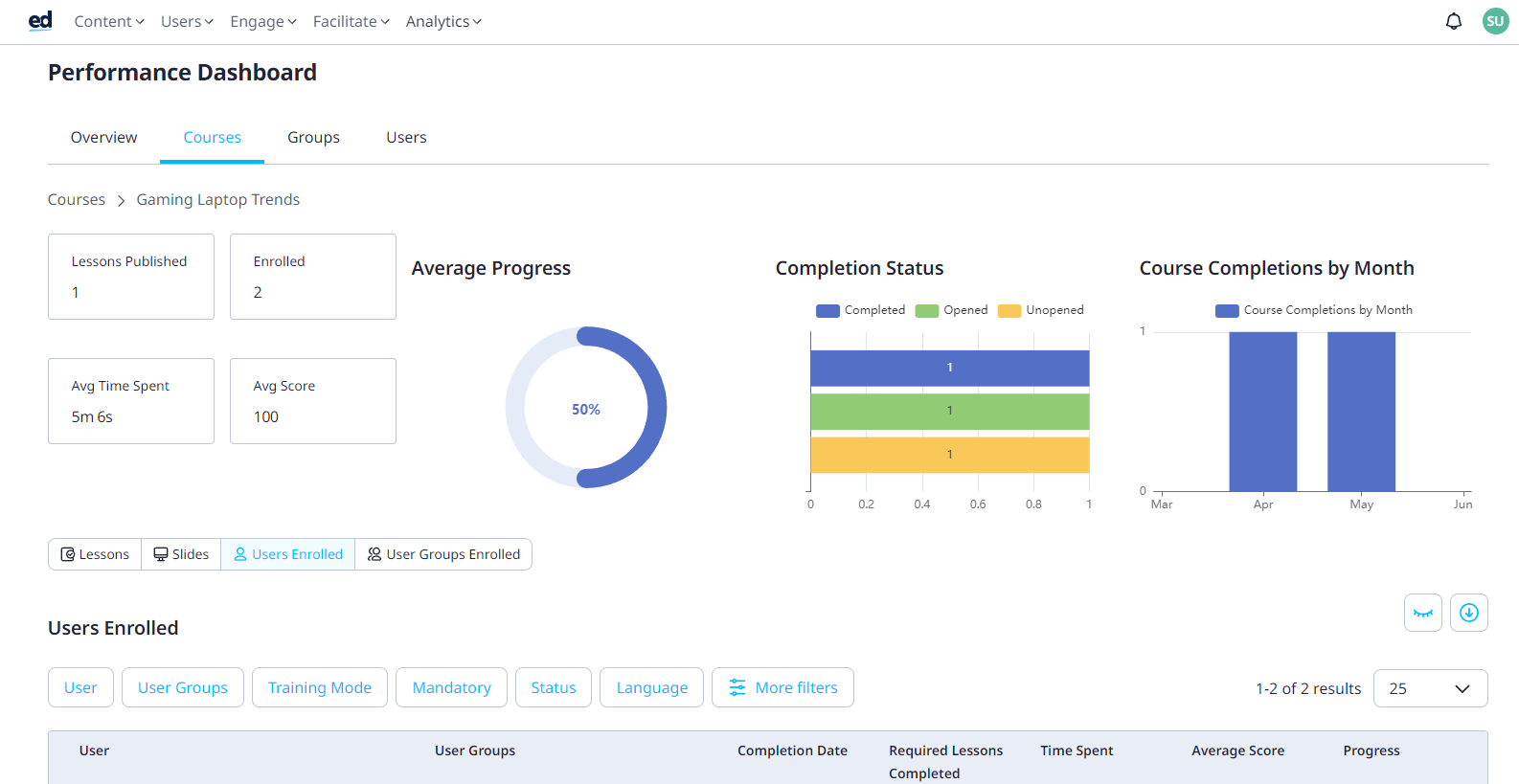
SC Training (formerly EdApp) is a great mobile-friendly platform designed to deliver engaging and effective training experiences that your team will enjoy. With the intuitive Creator Tool and a library of 80+ templates, you can build your courses in minutes or let the AI do the heavy lifting with the “Create with AI” feature.
SC Training offers a vast library of 1,000+ ready-made courses that you can customize to fit your brand. It’s a complete LMS that empowers you to assess and track your team’s understanding throughout the learning journey. Onboard new members, deliver targeted training, conduct on-the-job assessments, track performance, and certify your team, all within a single platform.
With features like gamification, microlearning, and mobile accessibility, SC Training ensures your team stays engaged and motivated to learn, no matter where they are.
What you will like:
- Go beyond traditional quizzes and assessments with SC Training’s Practical Assessments feature
- Reinforce learning and knowledge retention with the Rapid Refresh quiz maker, a fun and engaging way to combat the forgetting curve
- Offers specialized content and resources to foster a more inclusive workplace culture
- Provides course creation services, where expert instructional designers transform your existing materials into impactful microlearning content
What you may not like:
- Relies heavily on integrations with other platforms for video conferencing
- EdApp focuses too much on gamification, which may not be suitable for all learning styles or content types
- Reporting features need to be improved
Pricing:
Free plan available (Lacks advanced analytics). The paid plan starts at $5 per learner/month
Which Is the Best Learning Content Management System?
There isn’t a single “best” LCMS—it truly depends on your business needs. But if you ask me, I’d say my top three picks are:
ProProfs Training Maker
This tool’s ease of use and flexibility win me over. I am fond of how ProProfs Training Maker simplifies training creation and management. Its course library keeps all materials in one place, which I like for its ease of access. The version control ensures everyone works with the latest updates. Learning paths offer learners a clear, structured guide, which is a big plus.
Absorb LMS
Absorb is powerful for businesses with complex training needs that offer advanced customization and integrations. I like how it seamlessly handles large content libraries and makes it ideal for growing organizations looking to scale their training programs with minimal hassle.
Docebo
Docebo’s AI-powered features stand out, and I find it great for organizations that focus on interactive learning. Its ability to personalize learning experiences and automate tasks saves time and enhances learner engagement.
My Evaluation Criteria
The evaluation of learning content management systems in this blog post is based on six key factors to ensure a fair and well-rounded review:
- User Reviews / Ratings: I have collected feedback from real users, including ratings and reviews from trusted sources like G2, Capterra and other reputable source.
- Essential Features & Functionality: The value of a product is determined by its core features and how well it performs its intended functions. So, I have considered this as well.
- Ease of Use: User-friendliness is essential because it reflects how easy it is for all users, regardless of expertise, to use.
- Customer Support: The quality of customer support has been evaluated, from setup to troubleshooting.
- Value for Money: I have considered this factor to ensure my readers get good value for what they pay.
- Personal Experience / Experts’ Opinions: Insights from personal experience, combined with expert opinions, are considered to provide a comprehensive understanding of the product.
Use Cases of Learning Content Management Systems
Here’s a breakdown of how LCMS software serves different fields and its key features that enhance learning and training effectiveness:
| Use Cases | Relevant Features of LCMS |
|---|---|
| Corporate Training | Content personalization and easy course updates keep training relevant for employees. Tracking tools allow monitoring of progress, and reporting features help gauge success. |
| Educational Institutions | Centralized repository allows institutions to store courses, assignments, and multimedia content in one place. Easy access for students and tools to create engaging courses. |
| Healthcare Training | Compliance tracking ensures adherence to standards. LCMS provides easy-to-update modules on medical guidelines, with assessment tools to evaluate knowledge retention. |
| Nonprofit Organizations | Customizable content enables mission-aligned training. Multi-language support and mobile access ensure volunteers engage, regardless of location. |
| Sales & Customer Service Training | Rapid course creation for product updates and customer interaction skills. Interactive assessments prepare teams for real-world scenarios. |
Get Free LMS Software — All Features, Forever.
We've helped 567 companies train 200,000+ employees. Create courses in under a minute with our AI LMS or use 200+ ready-made courses on compliance, harassment, DEI, onboarding, and more!
Future Trends in Learning Content Management Systems
Having seen the huge popularity of these platforms, I can confidently say you can expect the following trends to shape the future of LCMS:
- Personalized Learning: AI is tailoring content more than ever and will adjust learning paths based on individual progress and preferences.
- Immersive VR/AR: Virtual and Augmented Reality brings hands-on simulations to help learners gain real-world experience in virtual settings.
- Microlearning: Bite-sized content continues to trend, offering quick, easily digestible lessons that fit seamlessly into busy schedules.
- Gamification: Platforms are adding game-like elements like badges, leaderboards, and rewards to boost engagement.
- Mobile Optimization: As mobile use rises, LCMS platforms ensure learning materials are accessible on any device, anytime, anywhere.
- Enhanced Security: Stronger data protection measures are a top priority that will safeguard sensitive information and ensure regulatory compliance.
These trends will make LCMS more personalized, interactive, and effective. Moreover, it will keep learners engaged and organizations ahead in a competitive world.
Ready to Pick the Best Learning Content Management System?
The future of learning is here, and it’s powered by learning content management systems. Whether you’re upskilling your workforce, onboarding new hires, or simply looking to deliver engaging and effective training, an LCMS is your key to success.
When choosing an LCSM, consider factors such as your organization’s size, training goals, budget, and desired level of customization.
So, don’t get left behind with outdated training methods. Explore the options in this list I have shared and find the perfect match for your needs. Unlock the potential of your organization’s learning journey.
 Tips
Tips
We’d love to hear your tips & suggestions on this article!
Get Free LMS Software — All Features, Forever.
We've helped 567 companies train 200,000+ employees. Create courses in under a minute with our AI LMS or use 200+ ready-made courses on compliance, harassment, DEI, onboarding, and more!

 We'd love your feedback!
We'd love your feedback! Thanks for your feedback!
Thanks for your feedback!






